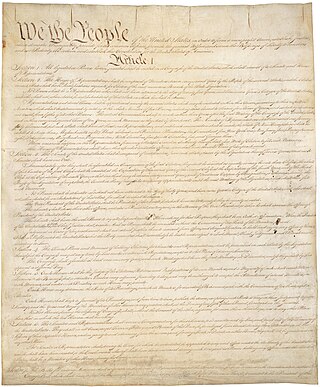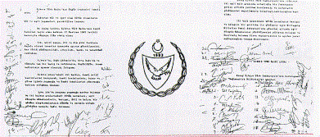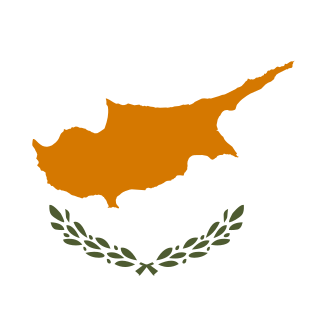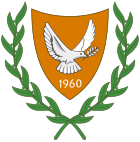The Republic of Cyprus is a unitary presidential representative republic, whereby the President of Cyprus is both head of state and head of government. Executive power is exercised by the government. Legislative power is vested in both the government and the parliament. The Judiciary is independent of the executive and the legislature.

The Constitution of the United States is the supreme law of the United States of America. It superseded the Articles of Confederation, the nation's first constitution, in 1789. Originally comprising seven articles, it delineates the national frame and constraints of government. The Constitution's first three articles embody the doctrine of the separation of powers, whereby the federal government is divided into three branches: the legislative, consisting of the bicameral Congress ; the executive, consisting of the president and subordinate officers ; and the judicial, consisting of the Supreme Court and other federal courts. Article IV, Article V, and Article VI embody concepts of federalism, describing the rights and responsibilities of state governments, the states in relationship to the federal government, and the shared process of constitutional amendment. Article VII establishes the procedure subsequently used by the 13 states to ratify it. The Constitution of the United States is the oldest and longest-standing written and codified national constitution in force in the world today.

The Cyprus problem, also known as the Cyprus conflict, Cyprus issue, Cyprus dispute, or Cyprus question, is an ongoing dispute between the leadership of the Greek Cypriot community in the southern portion of Cyprus, and that of the Turkish Cypriot community, situated in the north.
Civil liberties in the United States are certain unalienable rights retained by citizens of the United States under the Constitution of the United States, as interpreted and clarified by the Supreme Court of the United States and lower federal courts. Civil liberties are simply defined as individual legal and constitutional protections from entities more powerful than an individual, for example, parts of the government, other individuals, or corporations. The explicitly defined liberties make up the Bill of Rights, including freedom of speech, the right to bear arms, and the right to privacy. There are also many liberties of people not defined in the Constitution, as stated in the Ninth Amendment: The enumeration in the Constitution, of certain rights, shall not be construed to deny or disparage others retained by the people.
An entrenched clause or entrenchment clause of a constitution is a provision that makes certain amendments either more difficult or impossible to pass. Overriding an entrenched clause may require a supermajority, a referendum, or the consent of the minority party. The term eternity clause is used in a similar manner in the constitutions of Brazil, the Czech Republic, Germany, Greece, India, Iran, Italy, Morocco, Norway, and Turkey, but specifically applies to an entrenched clause that can never be overridden. However, if a constitution provides for a mechanism of its own abolition or replacement, like the German Basic Law does in Article 146, this by necessity provides a "back door" for getting rid of the "eternity clause", too.

Privacy laws of the United States deal with several different legal concepts. One is the invasion of privacy, a tort based in common law allowing an aggrieved party to bring a lawsuit against an individual who unlawfully intrudes into their private affairs, discloses their private information, publicizes them in a false light, or appropriates their name for personal gain.

The declaration of Independence of the Turkish Republic of Northern Cyprus was a unilateral declaration of independence (UDI) from the Republic of Cyprus by the Turkish Cypriot parliament on 15 November 1983.

The President of Cyprus, officially the President of the Republic of Cyprus, is the head of state and the head of government of Cyprus, as well as the commander-in-chief of the Cypriot National Guard. The office was established by the Constitution of 1960, after Cyprus gained its independence from the United Kingdom.

The Turkish invasion of Cyprus began on 20 July 1974 and progressed in two phases over the following month. Taking place upon a background of intercommunal violence between Greek and Turkish Cypriots, and in response to a Greek junta-sponsored Cypriot coup d'état five days earlier, it led to the Turkish capture and occupation of the northern part of the island.
The 1974 Cypriot coup d'état was a military coup d'état executed by the Cypriot National Guard and sponsored by the Greek military junta. On 15 July 1974 the coup plotters removed the sitting President of Cyprus, Archbishop Makarios III from office and installed pro-Enosis nationalist Nikos Sampson. The Sampson regime was described as a puppet state, whose ultimate aim was the annexation of the island by Greece; in the short term, the coupists proclaimed the establishment of the "Hellenic Republic of Cyprus". The coup was viewed as illegal by the United Nations.
The Fundamental Rights a in India enshrined in part III of the Constitution of India guarantee civil liberties such that all Indians can lead their lives in peace and harmony as citizens of India. These rights are known as "fundamental" as they are the most essential for all-round development i.e., material, intellectual, moral and spiritual and protected by fundamental law of the land i.e. constitution. If the rights provided by Constitution especially the Fundamental rights are violated the Supreme Court and the High Courts can issue writs under Articles 32 and 226 of the Constitution, respectively, directing the State Machinery for enforcement of the fundamental rights.

The London and Zürich Agreements for the constitution of Cyprus started with an agreement on 19 February 1959 in Lancaster House, London, between Turkey, Greece, the United Kingdom and Cypriot community leaders. On that basis, a constitution was drafted and agreed together with two prior Treaties of Alliance and Guarantee in Zürich on 11 February 1959.
Cypriot refugees are the Cypriot nationals or Cyprus residents who had their main residence in an area forcibly evacuated during the Cyprus conflict. The government of Cyprus also recognizes as refugees the descendants of the original refugees in the male line regardless of place of birth.
The 13 amendments proposed by Makarios III was a proposal by president of Cyprus Archbishop Makarios in 1963 for constitutional changes that altered the ways in which the two communities were represented in the government. This sparked a crisis between the Greek and Turkish Cypriots which led to the conflict known as 1963 Intercommunal strife.
Several distinct periods of Cypriot intercommunal violence involving the two main ethnic communities, Greek Cypriots and Turkish Cypriots, marked mid-20th century Cyprus. These included the Cyprus Emergency of 1955–59 during British rule, the post-independence Cyprus crisis of 1963–64, and the Cyprus crisis of 1967. Hostilities culminated in the 1974 de facto division of the island along the Green Line following the Turkish invasion of Cyprus. The region has been relatively peaceful since then, but the Cyprus dispute has continued, with various attempts to solve it diplomatically having been generally unsuccessful.
A de facto republic where Greek and Turkish Cypriots share many customs but maintain distinct identities based on religion, language, and close ties with their respective "motherlands", Cyprus is an island with a highly complex history of nationality due to its bi-communal nature and the ongoing conflict between the two groups. An internationally recognized region, Cyprus is partitioned into four main parts under effective control of the Republic of Cyprus, the Turkish Republic of Northern Cyprus, the UN-controlled Green Line, and British bases Akrotiri and Dhekelia respectively. Despite its history of conflict, the Green Line is now open and neighborly relationships are being fostered between the two groups.

The Constitution of the Turkish Republic of Northern Cyprus was prepared by the Constituent Assembly of Northern Cyprus after the declaration of independence on 15 November 1983, and was approved by the Turkish Cypriot electorate in a referendum on 5 May 1985 with a majority of 70.2% in favour. The constitution is similar to the 1975 Constitution of the Turkish Federated State of Cyprus, but had a number of new provisions regulating the needs of the new Republic. It has 164 articles and 13 transitional articles.

A constitutional referendum on a number of changes to the constitution was held in Turkey on 12 September 2010. The results showed the majority supported the constitutional amendments, with 58% in favour and 42% against. The changes were aimed at bringing the constitution into compliance with European Union standards. Supporters of Turkish EU membership hope constitutional reform will facilitate the membership process.

The Constitution of Turkey, formally known as the Constitution of the Republic of Türkiye, also known as the Constitution of 1982, is Turkey's fundamental law. It establishes the organization of the government,and sets out the principles and rules of the state's conduct along with its responsibilities in regards to its citizens. The constitution also establishes the rights and responsibilities of the latter while setting the guidelines for the delegation and exercise of sovereignty that belongs to the Turkish people.
Human rights in Northern Cyprus are protected by the constitution of Northern Cyprus. However, there have been reports of violations of the human rights of minorities, democratic freedom, freedom from discrimination, freedom from torture, freedom of movement, freedom of religion, freedom of speech, right to education, right to life, right to property, and the rights of displaced persons. The rights of Greek Cypriots displaced by the 1974 Turkish invasion of Cyprus, notably their rights to property and right of return, is one of the focal points of ongoing negotiations for the solution of the Cyprus question.












